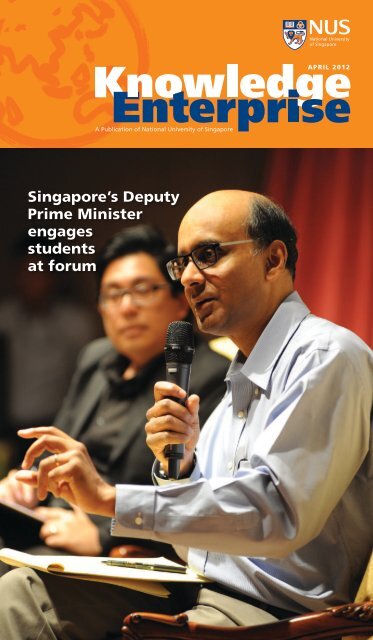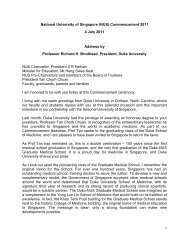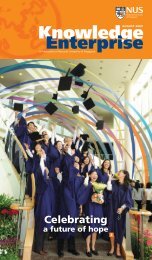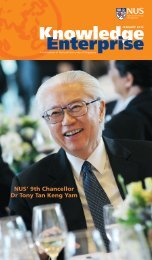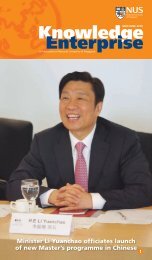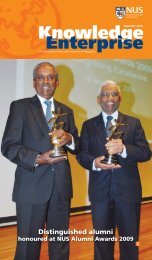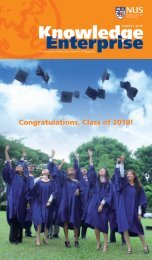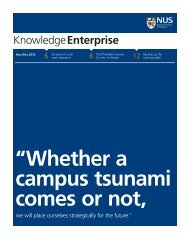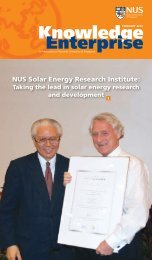Download PDF - NewsHub - National University of Singapore
Download PDF - NewsHub - National University of Singapore
Download PDF - NewsHub - National University of Singapore
- No tags were found...
You also want an ePaper? Increase the reach of your titles
YUMPU automatically turns print PDFs into web optimized ePapers that Google loves.
APRIL 2012<br />
A Publication <strong>of</strong> <strong>National</strong> <strong>University</strong> <strong>of</strong> <strong>Singapore</strong><br />
<strong>Singapore</strong>’s Deputy<br />
Prime Minister<br />
engages<br />
students<br />
at forum
New trustees on NUS Board<br />
Four new members joined the NUS Board <strong>of</strong><br />
Trustees in April 2012. They are Pr<strong>of</strong>essor Chan<br />
Heng Chee, <strong>Singapore</strong>’s Ambassador to the United<br />
States; Mr Andrew M Lim, Partner <strong>of</strong> Allen &<br />
Gledhill LLP; Mr Davinder Singh, Senior Counsel<br />
and Chief Executive Officer <strong>of</strong> Drew & Napier<br />
LLC; and Mr Abdullah Tarmugi, Member <strong>of</strong> the<br />
Presidential Council for Minority Rights and former<br />
Speaker <strong>of</strong> Parliament.<br />
NUS Board Chairman Mr Wong Ngit Liong, who is<br />
also Chief Executive Officer <strong>of</strong> Venture Corporation<br />
Ltd, said: “It is my privilege to welcome Heng<br />
Chee, Andrew, Davinder and Abdullah to the NUS<br />
Board. Together, they bring with them a wealth<br />
<strong>of</strong> experience, expertise and in-depth knowledge<br />
from their respective fields that will help us steer<br />
and guide NUS as it continues on<br />
its trajectory towards becoming a<br />
leading global university centred<br />
in Asia.”<br />
the <strong>University</strong>. He said the NUS community had<br />
benefitted tremendously from their visionary<br />
leadership, foresight and wisdom.<br />
They are Mr Hsieh Fu Hua, Chairman <strong>of</strong> Fullerton<br />
Fund Management Company Ltd; Pr<strong>of</strong>essor Edison<br />
Liu, President and Chief Executive Officer <strong>of</strong> The<br />
Jackson Laboratory; LG (NS) Ng Yat Chung, Group<br />
President and Chief Executive Officer <strong>of</strong> Neptune<br />
Orient Lines Ltd; and Mr Lucien Wong, Managing<br />
Partner <strong>of</strong> Allen & Gledhill LLP.<br />
Appointed by the Minister for Education,<br />
the 23-member NUS Board <strong>of</strong> Trustees<br />
comprises eminent business leaders, academics,<br />
entrepreneurs, and pr<strong>of</strong>essionals from the public<br />
and private sectors.<br />
Mr Wong also expressed<br />
gratitude, on behalf <strong>of</strong> the Board<br />
and NUS, to four former trustees<br />
who had stepped down recently<br />
for their many years <strong>of</strong> dedicated<br />
service and contributions to<br />
(From left) New NUS Board Members Pr<strong>of</strong> Chan, Mr Lim, Mr Singh and Mr Abdullah<br />
KNOWLEDGE ENTERPRISE<br />
2<br />
ASEAN university leaders gather for<br />
intellectual exchange<br />
About 60 university presidents and senior leaders<br />
from 17 Association <strong>of</strong> Southeast Asian Nations<br />
(ASEAN) universities participated in the inaugural<br />
Temasek Foundation-NUS Programme for<br />
Leadership in <strong>University</strong> Management from 5 to<br />
9 March at NUS.<br />
The new initiative, supported by Temasek<br />
Foundation (TF) through a grant <strong>of</strong> about<br />
S$700,000 over two years, aims to bring together<br />
university leaders to share, generate and advance<br />
breakthrough ideas and practices for the<br />
management <strong>of</strong> Asian universities. Topics discussed<br />
at the meeting included higher education in the<br />
21st century; managing change at the university;<br />
faculty appointment, development and retention;<br />
educational philosophy and curriculum reform;<br />
internationalisation; and quality assurance<br />
framework.<br />
Pr<strong>of</strong> Tan (right) presenting Mr Cheong with a token <strong>of</strong><br />
appreciation at the TF-NUS programme’s launch<br />
Asian universities are at a<br />
very exciting phase <strong>of</strong> their<br />
development, with unique new<br />
opportunities associated with<br />
the rapid rise <strong>of</strong> Asia. To excel,<br />
Asian universities must develop<br />
strong expertise in governance,<br />
academic leadership and<br />
management.<br />
– Pr<strong>of</strong> Tan<br />
Speaking at the programme’s launch, NUS<br />
President Pr<strong>of</strong>essor Tan Chorh Chuan said: “We<br />
hope this programme can be the catalyst for<br />
exciting and productive change for all <strong>of</strong> us, as we<br />
chart our individual courses towards excellence.”<br />
He expressed the <strong>University</strong>’s gratitude to TF for<br />
its strong and unstinting support, and thanked<br />
TF Deputy Chairman Ms Jennie Chua and Chief<br />
Executive Officer Mr Benedict Cheong for gracing<br />
the event.<br />
Calling NUS “a valued partner” in TF’s quest to<br />
build and sustain a prosperous and peaceful<br />
Asia <strong>of</strong> the future, Mr Cheong said: “We have<br />
partnered NUS in 12 distinctive programmes, all<br />
designed to bring about the institutionalisation<br />
<strong>of</strong> learning and a long-term positive impact on<br />
communities in Asia in areas such as education,<br />
health care and public management.”
DPM Tharman’s vision <strong>of</strong> an<br />
inclusive <strong>Singapore</strong><br />
Ensuring that no <strong>Singapore</strong>an gets left behind<br />
is not just about the government redistributing<br />
resources to help the poor. Deputy Prime Minister<br />
Tharman Shanmugaratnam shared his deep<br />
insights and high aspirations for an inclusive<br />
<strong>Singapore</strong> with over 200 students at the Kent Ridge<br />
Ministerial Forum 2012 held on 4 April in NUS’<br />
<strong>University</strong> Town.<br />
Rather than the government providing benefits<br />
for every disadvantaged group, DPM Tharman felt<br />
that a society where everyone has a fair chance <strong>of</strong><br />
succeeding is dependent upon everyone playing<br />
their part. He said: “We’ve got to make sure that<br />
everyone shares in the social culture <strong>of</strong> aspiring.<br />
Wherever you start, aspire to do better. And if we<br />
can achieve that social culture and keep it going,<br />
no one will be left behind.”<br />
He also noted that an inclusive society will only<br />
blossom if we cultivate the spirit <strong>of</strong> responsibility<br />
and community. Besides having a truly learning<br />
nation where everyone keeps improving, he<br />
stressed the need for <strong>Singapore</strong>ans to look after<br />
their families and also help others in the local<br />
community to move up.<br />
The government needs to step up its social policies<br />
but also make sure they are sustainable, he said.<br />
Its mission, he pointed out, is not just to build but<br />
also to sustain a fair and inclusive society for our<br />
children’s generation and their children, without<br />
increasing the burden <strong>of</strong> the next generation.<br />
DPM Tharman’s sharing set the stage for a<br />
stimulating 90-minute dialogue that ensued with<br />
the student audience who had many burning<br />
questions to ask him. About 130 questions were<br />
submitted online even before the start <strong>of</strong> the<br />
forum. The students voiced concerns over the<br />
impact <strong>of</strong> government policies on education, job<br />
security, salaries, housing, transport and the quality<br />
<strong>of</strong> life. A range <strong>of</strong> people groups were touched on,<br />
DPM Tharman addressed the topic <strong>of</strong> “No <strong>Singapore</strong>an<br />
Left Behind”<br />
including the Malay community, the middle class,<br />
blue collar workers, foreign talents, single mothers,<br />
AIDS patients, and gifted individuals who were<br />
academically weak.<br />
DPM Tharman, who is also Minister for Finance<br />
and Manpower, gave thoughtful and perceptive<br />
responses, explaining the thinking and approaches<br />
to these complex issues with great clarity.<br />
The annual Kent Ridge Ministerial Forum is<br />
organised by the NUS Students’ Political Association<br />
with the aim <strong>of</strong> cultivating awareness and<br />
interest in political issues <strong>of</strong> social and economic<br />
importance. The thought-provoking questions<br />
raised at this year’s forum were indicative <strong>of</strong> the<br />
more politically conscious and engaged tertiary<br />
student community in <strong>Singapore</strong> today.<br />
Some <strong>of</strong> DPM Tharman’s comments on …<br />
Influx <strong>of</strong> foreign talents<br />
“Most <strong>of</strong> our economy is about<br />
competition with others for a slice <strong>of</strong> the<br />
global market. So even if you don’t have<br />
foreigners here with you, you are still<br />
competing with foreigners somewhere<br />
else.… If you don’t provide opportunities<br />
in <strong>Singapore</strong> for enterprises to be globalclass<br />
and highly competitive and for<br />
<strong>Singapore</strong>ans to work in the best teams,<br />
we will lose more <strong>Singapore</strong>ans.”<br />
Rising cynicism towards<br />
government policies<br />
“It is important for us to<br />
retain a relationship <strong>of</strong><br />
trust between whoever is<br />
the elected government<br />
and the people.… We<br />
have to engage a lot more,<br />
take nothing for granted<br />
and win adherence … by<br />
involving <strong>Singapore</strong>ans.”<br />
Education initiatives<br />
“We are expanding tertiary opportunities<br />
right across the system, including university<br />
places … not just the same style but<br />
different types <strong>of</strong> education … Education<br />
must remain our central approach <strong>of</strong><br />
ensuring that everyone does better.”<br />
This year’s ministerial forum<br />
saw a more participative<br />
young audience with bold and<br />
thought-provoking questions<br />
Quality <strong>of</strong> questions<br />
“You asked very good<br />
questions and it shows that<br />
you are thinking actively<br />
about the type <strong>of</strong> society<br />
we should be.”<br />
APRIL 2012<br />
3
Department <strong>of</strong> Political Science<br />
celebrates its golden jubilee<br />
In 1961, NUS’ political science department was<br />
established at the then <strong>University</strong> <strong>of</strong> Malaya with<br />
merely two faculty members and an inaugural<br />
class <strong>of</strong> about 40 students. Today, the department<br />
has close to 40 academic staff and 80 honours<br />
graduates a year. The total enrolment <strong>of</strong> political<br />
science modules this year is nearly 4,000.<br />
At its 50th anniversary dinner on 30 March 2012,<br />
Head <strong>of</strong> Department Pr<strong>of</strong>essor Terry Nardin said:<br />
“In some ways, the history <strong>of</strong> the department<br />
mirrors that <strong>of</strong> NUS and <strong>Singapore</strong> itself. Having<br />
encountered many challenges over the decades,<br />
it has matured into one that is recognised<br />
internationally as among the best in Asia.” Besides<br />
its history and current status, he also shared the<br />
department’s plans and hopes for the future with<br />
the 250 students, faculty and alumni in attendance.<br />
Also speaking at the event was Guest-<strong>of</strong>-Honour<br />
Pr<strong>of</strong>essor Chan Heng Chee, Ambassador <strong>of</strong><br />
<strong>Singapore</strong> to the United States. She was among<br />
the first batch <strong>of</strong> political science students in the<br />
department, the first <strong>Singapore</strong>an on its staff<br />
team, and Head <strong>of</strong> Department from 1985 to 1987.<br />
Relating her personal experiences as a student,<br />
lecturer and practitioner, she said: “It was not until<br />
I became a diplomat that I found I had to marry<br />
political science with operational requirements,<br />
and that was when I really appreciated the uses <strong>of</strong><br />
political science and also its limits.”<br />
Pr<strong>of</strong> Chan found her training and<br />
experience as a political scientist to be<br />
excellent preparation for her job as<br />
<strong>Singapore</strong>’s Permanent Representative<br />
to the United Nations from 1989 to<br />
1991 and diplomat for almost 16<br />
years in Washington, DC. In these<br />
capacities, she also gained practical<br />
insights such as the importance <strong>of</strong><br />
personal relationships and people skills,<br />
the entrepreneurial dimension <strong>of</strong> a<br />
diplomat’s role, and the astute use <strong>of</strong><br />
technology in the practice <strong>of</strong> politics<br />
and diplomacy.<br />
KNOWLEDGE ENTERPRISE<br />
4<br />
(From left) Assoc Pr<strong>of</strong> Hussin Mutalib, Pr<strong>of</strong> Chan and Pr<strong>of</strong> Nardin during<br />
the cake-cutting ceremony<br />
Seeking solutions to water issues<br />
In conjunction with World Water Day on 22 March,<br />
NUS Global Asia Institute (NUS-GAI) held a<br />
dialogue session as part <strong>of</strong> its speaker series, with<br />
engineering expert Pr<strong>of</strong>essor Lui Pao Chuen. He<br />
spoke on the topic <strong>of</strong> possible solutions to water<br />
shortage and flooding in <strong>Singapore</strong>.<br />
With increased annual rainfall beyond the capacity<br />
that the nation’s drainage system could cope with,<br />
Pr<strong>of</strong> Lui proposed harvesting storm water with<br />
shafts and tunnels to build underground reservoirs<br />
in rock caverns 100 metres beneath the surface. Not<br />
only would such channelling <strong>of</strong> storm water help in<br />
flood alleviation, he thought the reservoirs could<br />
also serve as storehouses for freshwater in the<br />
event <strong>of</strong> drought, thus reducing dependence on<br />
energy for water treatment.<br />
An Adjunct Pr<strong>of</strong>essor at the NUS Faculty <strong>of</strong><br />
Engineering since 1990, Pr<strong>of</strong> Lui is the Advisor to<br />
the <strong>National</strong> Research Foundation, a department<br />
under the Prime Minister’s Office. In 2012, he was<br />
appointed by the Ministry <strong>of</strong> <strong>National</strong> Development<br />
as Advisor <strong>of</strong> the Underground Master Plan Task<br />
Force.<br />
The gala dinner was a culmination<br />
<strong>of</strong> a series <strong>of</strong> golden jubilee events,<br />
including a forum on the general<br />
elections and mock parliament<br />
sittings helmed by students, organised<br />
respectively by its alumni and the<br />
Political Science Society.<br />
His presentation was followed by a panel discussion<br />
featuring Pr<strong>of</strong>essor K E Seetharam, NUS-GAI<br />
Director who is a renowned water policy expert;<br />
and Pr<strong>of</strong>essor Chan Eng Soon, engineering faculty’s<br />
Dean. Pr<strong>of</strong> Chan is also the Chairman <strong>of</strong> the Expert<br />
Panel on Drainage Design and Flood Protection<br />
Measures, appointed by the Ministry <strong>of</strong> the<br />
Environment and Water Resources.<br />
Pr<strong>of</strong> Lui sharing his novel solutions to water shortage and<br />
flooding in <strong>Singapore</strong>
NUS Open House 2012<br />
– window to opportunities for change<br />
“A transformative education that nurtures thinking<br />
individuals who are alive to opportunities to make<br />
a difference, are valued members and leaders <strong>of</strong><br />
society, and global citizens effective in diverse<br />
settings” – this is a key thrust <strong>of</strong> NUS’ mission and<br />
what the <strong>University</strong> seeks to <strong>of</strong>fer prospective<br />
students. In line with this, NUS’ admissions campaign<br />
tagline this year was aptly titled “The Change is<br />
Me”.<br />
Opportunities for advancement and change were<br />
indeed a key attraction that drew close to 17,000<br />
prospective students and their families to the NUS<br />
Open House on 17 and 18 March. As one <strong>of</strong> the<br />
leading universities in the region with more than<br />
100 years <strong>of</strong> history, NUS has developed a diverse<br />
and comprehensive range <strong>of</strong> quality education and<br />
research programmes, making it a choice option<br />
among prospective students.<br />
(2nd and 3rd persons from left) NUS President Pr<strong>of</strong> Tan<br />
Chorh Chuan and Deputy President (Academic Affairs) and<br />
Provost Pr<strong>of</strong> Tan Eng Chye at the medicine school booth<br />
As expected, the admissions and<br />
faculty talks that ran throughout<br />
both days captured the most<br />
interest. The audiences were<br />
fascinated by the breadth <strong>of</strong><br />
subject choices and learning<br />
opportunities such as overseas<br />
exchange programmes and<br />
internships. The attendees also<br />
capitalised on the occasion<br />
to seek advice from faculty<br />
members and make enquires at<br />
information booths set up by<br />
NUS’ 12 undergraduate faculties<br />
and schools.<br />
Two new highlights this year<br />
were the Yale-NUS College<br />
(Yale-NUS) and <strong>University</strong> Town’s Enthusiastic student visitors waving the Open House brochures<br />
(UTown) Angsana College<br />
admissions activities. Yale-NUS, <strong>Singapore</strong>’s first<br />
residential liberal arts college, will welcome its<br />
inaugural batch <strong>of</strong> undergraduates in 2013, and is<br />
already making waves among prospective students<br />
locally and abroad. Its publicity initiatives in the<br />
past few months, which have drawn immense<br />
enthusiasm, included tea sessions, an exhibition,<br />
mock lectures and sharing sessions by illustrious<br />
alumni <strong>of</strong> Yale <strong>University</strong> and prominent industry<br />
leaders.<br />
Also on the drive to attract suitable student<br />
candidates was Angsana College, the third and<br />
latest residential college at UTown, which will open<br />
this August. The campus tours to UTown during<br />
Open House gave visitors an onsite experience <strong>of</strong><br />
its conducive study, living and interactive spaces,<br />
beyond what an online virtual tour could simulate.<br />
There were also tours to Bukit Timah Campus where<br />
Law School held its Open House. For tours around<br />
the main Kent Ridge Campus, an exciting new<br />
stop was N-House (ENterprise House). A distinctive<br />
enterpreneurial hub within the Prince George’s Park<br />
Residences for sharing, networking and mentoring<br />
activities, N-House houses students and interns<br />
Keen interest from prospective students at Yale-NUS’<br />
information booth<br />
who have participated in the NUS Overseas<br />
Colleges and innovative Local Enterprise Achiever<br />
Development (iLEAD) programmes.<br />
The Open House highlights also included a<br />
Student Life Exhibition organised by the NUS<br />
Students’ Union, which showcased a variety <strong>of</strong><br />
sports, community service, arts and culture as well<br />
as special interest groups.<br />
APRIL 2012<br />
5
KNOWLEDGE ENTERPRISE<br />
ACCOLADES<br />
6<br />
NUS rises in world reputation<br />
NUS clinched the 23rd spot in the 2012 World<br />
Reputation Rankings published recently by Times<br />
Higher Education (THE), advancing four places from<br />
its 27th position last year. The results also reflected<br />
its strong showing among Asian universities – NUS<br />
was third, after <strong>University</strong> <strong>of</strong> Tokyo and Kyoto<br />
<strong>University</strong>.<br />
The 2012 reputation rankings, which complement<br />
the World <strong>University</strong> Rankings, were based on<br />
the world’s largest academic reputation survey <strong>of</strong><br />
17,554 experienced academics from 137 countries.<br />
NUS President Pr<strong>of</strong>essor Tan Chorh Chuan said:<br />
“We are delighted to be placed among the leading<br />
• Fourth year Industrial Design student Mr Darren<br />
Yeo won the top prize at the Mapletree Business<br />
City’s (MBC) “Design in the City” outdoor<br />
furniture competition. He outshone 63 others<br />
with his cloud-inspired design named “Laputa”.<br />
Darren’s winning entry was a cloud-inspired furniture<br />
design<br />
Besides a cash prize <strong>of</strong> S$12,000, Darren also<br />
received a much coveted internship with<br />
internationally renowned product designer<br />
Mr Toshiyuki Kita in Osaka, Japan, co-sponsored<br />
by Mapletree and Design<strong>Singapore</strong> Council. His<br />
winning entry will be fabricated and installed<br />
publicly at MBC.<br />
• Ms Selene Chew won the Netexplo Grand Prix<br />
2012 for “BlindSpot”, a smart cane for the<br />
visually handicapped that she created for her<br />
final year thesis. The first Asian and youngest<br />
winner in the award’s history, she was honoured<br />
at the United Nations Educational, Scientific and<br />
Cultural Organisation (UNESCO) headquarters in<br />
Paris on 15 March.<br />
earpiece<br />
phone<br />
smart<br />
cane<br />
The innovative cane encompasses a Bluetooth earpiece<br />
and a detachable phone<br />
universities in the world and in Asia, and with the<br />
recognition given to NUS’ world-class education<br />
and research.” He found this to be a strong<br />
endorsement <strong>of</strong> the <strong>University</strong>’s continued efforts<br />
to pioneer educational innovations that provide a<br />
top quality education; global student exchange and<br />
internship opportunities; as well as its cutting-edge<br />
research.<br />
Attributing NUS’ strong performance to its talented<br />
faculty, staff, students and alumni, Pr<strong>of</strong> Tan said<br />
that their dynamism and commitment are pivotal<br />
to the <strong>University</strong>’s efforts to be global in vision,<br />
goals and quality, and with special expertise,<br />
insights and connections in Asia.<br />
BlindSpot is a white cane with a built-in mobile<br />
phone, ultrasound sensor and tactile navigator.<br />
It can detect hanging objects and ground<br />
obstacles as well as friends and family members<br />
in the vicinity. A Bluetooth earpiece connected<br />
to the cane and a navigation interface help<br />
connect and guide the user to meet them.<br />
Additionally, the foldaway, rechargeable cane<br />
can be converted into a mobile phone when the<br />
user is at home.<br />
The recent NUS graduate is currently working<br />
at the <strong>University</strong>’s Design Incubation Centre to<br />
further develop the product.<br />
• FiETT, an NUS Enterprise incubatee company, was<br />
one <strong>of</strong> the five winners <strong>of</strong> the DEMOguru Award<br />
at the inaugural DEMOAsia event in March. The<br />
company was recognised for its outstanding<br />
presentation <strong>of</strong> ISGLOVES TM , its signature product.<br />
ISGLOVES TM is the only double-layered touch screen<br />
gloves-cum-mittens in the market<br />
FiETT was founded by four NUS students –<br />
Ms Charmain Tan from the Faculty <strong>of</strong> Science,<br />
Ms Cia Zhi Yun from the School <strong>of</strong> Design and<br />
Environment, and Mr Fitzkhoon Liang and<br />
Mr Tan Yan Liang from the Faculty <strong>of</strong><br />
Engineering. Three <strong>of</strong> the students had<br />
participated in the NUS Overseas Colleges<br />
programme.<br />
ISGLOVES TM , which is made <strong>of</strong> special conductive<br />
materials, allows the wearer to operate touch<br />
screen devices such as smart phones and tablet<br />
computers that rely on faint electrical signals<br />
from the fingers. Additionally, with a unique<br />
design for trapping heat between the fingers,<br />
ISGLOVES TM can also double up as mittens.
Decades-old chemical conundrum<br />
demystified<br />
A multinational research team led by Assistant<br />
Pr<strong>of</strong>essor Kim Chu-Young from NUS’ Department<br />
<strong>of</strong> Biological Sciences unravelled a chemical mystery<br />
that had confounded both chemists and biologists<br />
for decades. They discovered how a soil bacterium,<br />
Streptomyces lasaliensis, is able to convert an<br />
epoxide into a six-membered cyclic ether during<br />
synthesis <strong>of</strong> lasalocid, a natural polyether antibiotic.<br />
Their insights into this surprising chemical<br />
transformation that was deemed kinetically<br />
unfavourable were presented in a paper published<br />
in Nature on 5 March.<br />
expected to contain a five-membered ring instead<br />
<strong>of</strong> the observed six-membered ring, according to<br />
“Baldwin’s Rules for Ring Closure”.<br />
With a deeper understanding <strong>of</strong> the unique<br />
Lsd19 enzyme’s protein structure and critical role<br />
in catalysing the formation <strong>of</strong> two cyclic ether<br />
moieties that are part <strong>of</strong> the lasalocid structure, the<br />
researchers could shed light on the phenomenon.<br />
Photo: Dr Kinya Hotta<br />
The crystal structure <strong>of</strong> Lsd19 determined at 1.59 Å<br />
resolution (PDB ID: 3RGA). The X-ray diffraction data<br />
was collected at beam line 7-1 <strong>of</strong> Stanford Synchrotron<br />
Radiation Lightsource<br />
Dr Kim working in the X-ray Crystallography Laboratory <strong>of</strong><br />
NUS’ Department <strong>of</strong> Biological Sciences<br />
Through the use <strong>of</strong> powerful X-rays, the team<br />
comprising researchers from NUS, <strong>University</strong><br />
<strong>of</strong> Oxford, Hokkaido <strong>University</strong>, <strong>University</strong> <strong>of</strong><br />
Shizuoka, Stanford <strong>University</strong> and <strong>University</strong> <strong>of</strong><br />
California at Los Angeles, could decipher how<br />
the antibiotic-producing S. lasaliensis defies a<br />
longstanding set <strong>of</strong> chemical rules. Lasalocid was<br />
New research centre to address<br />
industrial carbon footprint<br />
The <strong>University</strong> <strong>of</strong> Cambridge will partner NUS and<br />
Nanyang Technological <strong>University</strong> (NTU) to set<br />
up a new research centre in <strong>Singapore</strong> under the<br />
<strong>National</strong> Research Foundation’s (NRF) Campus for<br />
Research Excellence And Technological Enterprise<br />
(CREATE) programme.<br />
Drawing on expertise across the three universities<br />
and <strong>Singapore</strong>’s Institute for Chemical and<br />
Engineering Science, the centre serves to advance<br />
the “Cambridge Centre for Carbon Reduction<br />
in Chemical Technology (C4T)” programme. It<br />
will focus on minimising the carbon footprint <strong>of</strong><br />
industrial-scale chemical processes through state<strong>of</strong>-the-art<br />
experimental analysis and computational<br />
modelling research. The team will explore ways<br />
<strong>of</strong> improving energy efficiency and strategies for<br />
carbon capture and use in the petrochemical and<br />
refining technologies.<br />
“Given the magnitude <strong>of</strong> the challenge and<br />
the need for urgent action to address climate<br />
“Our study has broad implications because the<br />
six-membered cyclic ether is a common structural<br />
feature found in hundreds <strong>of</strong> drug molecules<br />
produced by nature,” said Dr Kim. “We have<br />
analysed the genes <strong>of</strong> six other organisms that<br />
produce similar polyether drugs and we are now<br />
confident that the biosynthetic strategy we have<br />
uncovered is also used by those organisms.”<br />
The new understanding <strong>of</strong> how nature synthesises<br />
the six-membered rings may enable chemists to<br />
develop new methods to produce more effective<br />
and affordable polyether drugs available to the<br />
public.<br />
change, it is timely that a world-leading, enduring<br />
collaboration has been established to undertake<br />
fundamental and applied research aimed at<br />
reducing the carbon footprint <strong>of</strong> <strong>Singapore</strong>’s<br />
refining, chemicals and power generation sectors,”<br />
said Vice-Chancellor <strong>of</strong> the <strong>University</strong> <strong>of</strong> Cambridge,<br />
Pr<strong>of</strong>essor Sir Leszek Borysiewicz.<br />
NUS President Pr<strong>of</strong>essor Tan Chorh Chuan said that<br />
the <strong>University</strong> has made significant efforts over the<br />
last few years to develop ideas for reducing the<br />
carbon footprint <strong>of</strong> the chemicals industry sector<br />
which is vitally important to <strong>Singapore</strong>’s economy.<br />
He added: “NUS has committed its top experts<br />
in the relevant fields to this C4T programme and<br />
looks forward to contributing with Cambridge and<br />
NTU to the reduction <strong>of</strong> CO 2 emissions and a more<br />
sustainable chemicals industry for the future.”<br />
The centre, to be established by 2013, will be based<br />
at the CREATE premises in NUS <strong>University</strong> Town,<br />
with laboratory space in NUS and NTU.<br />
APRIL 2012<br />
7
Tan Chin Tuan Foundation supports<br />
Chinese studies at Yale-NUS<br />
The model <strong>of</strong> liberal arts education<br />
at Yale-NUS College (Yale-NUS), a<br />
landmark collaboration between<br />
Yale <strong>University</strong> and NUS, will<br />
be distinctive in many aspects.<br />
In addition to the traditional<br />
emphasis on Western thinkers and<br />
philosophers, it will be enriched with<br />
Asian perspectives and experiences<br />
as well as opportunities for crosscultural<br />
and comparative learning.<br />
Supporting this cause, the Tan Chin<br />
Tuan Foundation has pledged to give S$5 million<br />
for a Pr<strong>of</strong>essorship in China and Chinese Studies<br />
and a Programme in Chinese Culture and<br />
Civilisation for undergraduate students.<br />
“The Tan Chin Tuan Foundation is a longstanding<br />
leader in philanthropy that creates a broad<br />
societal impact. NUS is very grateful to be able to<br />
partner the Foundation to nurture leaders with<br />
the intellectual qualities and the multidimensional<br />
perspectives so crucial for Asia and the world,”<br />
said Yale-NUS Governing Board Member and NUS<br />
President Pr<strong>of</strong>essor Tan Chorh Chuan.<br />
The Foundation’s Deputy<br />
Chairman Ms Chew Gek Khim<br />
said: “We hope that our gift<br />
to Yale-NUS will instill a sense<br />
<strong>of</strong> history and tradition in our<br />
local and regional communities,<br />
making an education in<br />
<strong>Singapore</strong> and the region<br />
unique. Our Foundation will<br />
link Yale-NUS with other<br />
institutions supporting Chinese<br />
studies, and should enable<br />
Yale-NUS to have a pivotal role<br />
in perpetuating knowledge and understanding<br />
<strong>of</strong> China, as well as the study in <strong>Singapore</strong> <strong>of</strong><br />
Chinese history, culture and civilisation.”<br />
Pr<strong>of</strong> Hansen giving her first<br />
public lecture as visiting Tan<br />
Chin Tuan Pr<strong>of</strong>essor<br />
Pr<strong>of</strong>essor Valerie Hansen, a well-known expert in<br />
Chinese History at Yale <strong>University</strong>, was the first<br />
visiting Tan Chin Tuan Pr<strong>of</strong>essor. She delivered<br />
a public lecture on “Contending Superpowers:<br />
the Defeat <strong>of</strong> China” at NUS on 3 April, which<br />
touched on the triumph <strong>of</strong> the Kitan over the<br />
Chinese during the Song Dynasty resulting in a<br />
globalised world in 1004 that much resembled<br />
today’s world.<br />
Championing fight against malaria<br />
She found it unacceptable that so many people<br />
suffer and die from such a preventable and<br />
treatable disease. That was why Her Royal<br />
Highness (HRH) Princess Astrid <strong>of</strong> Belgium became<br />
the Special Representative <strong>of</strong> the Roll Back Malaria<br />
(RBM) Partnership.<br />
Speaking as Guest-<strong>of</strong>-Honour at a special forum<br />
on the fight against malaria held on 11 April at<br />
NUS, she shared that malaria kills nearly 700,000<br />
people a year despite progress, including one child<br />
each minute; and that Asia accounts for the second<br />
highest malaria burden, outside <strong>of</strong> Africa.<br />
“The work being conducted here at NUS gives<br />
me hope. I’m impressed to see your innovative<br />
research which leads to a better understanding <strong>of</strong><br />
this disease and to new methods for combatting<br />
it,” she said.<br />
The RBM, United Nation’s coordinating body for<br />
the global fight against malaria, is a co-organiser<br />
<strong>of</strong> the forum, together with NUS and UBS. Over<br />
the past decade, the UBS Optimus Foundation<br />
has provided about 5 million Swiss francs (about<br />
S$6.8 million) in support <strong>of</strong> this cause. It focuses<br />
on funding innovative efforts to prevent children<br />
from being infected with malaria and to improve<br />
management <strong>of</strong> children suffering from the<br />
disease.<br />
The forum is part <strong>of</strong> the NUS Greater Good Series<br />
supported by Newsman Realty, which features<br />
talks by leading minds on topics related to<br />
philanthropy.<br />
KNOWLEDGE ENTERPRISE<br />
8<br />
Recognising the formidable task in preventing,<br />
treating and eradicating malaria, NUS Deputy<br />
President (Academic Affairs) and Provost Pr<strong>of</strong>essor<br />
Tan Eng Chye said: “It is thus truly an honour to<br />
host the Roll Back Malaria delegation, and to pay<br />
tribute to their longstanding work to provide a<br />
coordinated global response to this disease, and to<br />
encourage greater commitment to global malaria<br />
control efforts.”<br />
KNOWLEDGE ENTERPRISE n APRIL 2012 VOLUME 11 NO. 09<br />
Editor: Fua Lee Na<br />
Office <strong>of</strong> Corporate Relations, <strong>National</strong> <strong>University</strong> <strong>of</strong> <strong>Singapore</strong><br />
<strong>University</strong> Hall, Lee Kong Chian Wing UHL#05-03, 21 Lower Kent Ridge Road, <strong>Singapore</strong> 119077<br />
Tel: (65) 6601 1341 Fax: (65) 6775 6386 E-mail: Knowledge_Enterprise@nus.edu.sg Website: newshub.nus.edu.sg<br />
ISSN 0219-614X Company Registration Number: 200604346E<br />
HRH Princess Astrid with NUS Chairman Mr Wong Ngit<br />
Liong at the special forum<br />
For further information on the NUS Greater Good Series, contact Jeanne Ng at jeanne.ng@nus.edu.sg.<br />
Cover photo: Education Minister Mr Heng Swee Keat (centre) with two new graduates.


